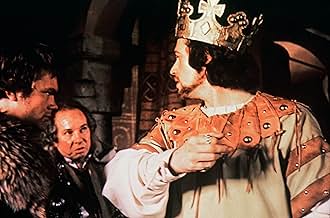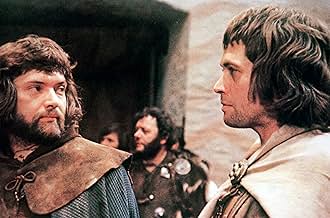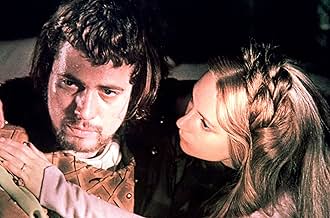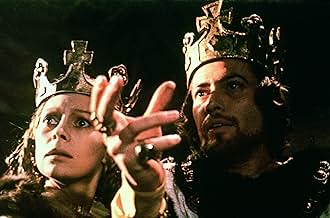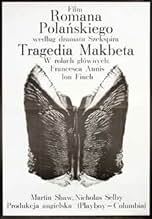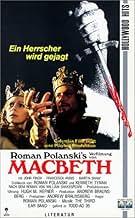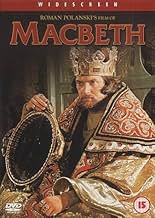NOTE IMDb
7,4/10
16 k
MA NOTE
Un seigneur écossais impitoyable et ambitieux s'empare du trône avec l'aide de sa femme conspiratrice et d'un trio de sorcières.Un seigneur écossais impitoyable et ambitieux s'empare du trône avec l'aide de sa femme conspiratrice et d'un trio de sorcières.Un seigneur écossais impitoyable et ambitieux s'empare du trône avec l'aide de sa femme conspiratrice et d'un trio de sorcières.
- Réalisation
- Scénario
- Casting principal
- Victoire aux 1 BAFTA Award
- 3 victoires et 2 nominations au total
Avis à la une
I remember watching this film in my Grade 11 English class when we were studying William Shakespeare's "Macbeth". Reading the story a couple of times, I rather enjoyed the classic tale to a degree. Whether or not it would convincingly translate to film, I, along with my class, was about to find out...with Roman Polanski's 1971 film adaptation, also produced by - HUGH HEFNER?!? As strangely amusing as the "Playboy" credit seemed in the opening credits, we were prepared for a very interesting take on the famous, violent play.
Shakespearean tragedies/comedies being translated to film are nothing new, of course. There have been some clear hits and misses over the decades - but fortunately, "Macbeth" does not fall into that latter "miss" category, for it is a tremendously underrated, very surprising, and overall competently made film. Roman Polanski is an excellent director here, and the acting, music, and effects (some of which - particularly the "dagger/murder" sequence - perversely amused my fellow classmates, who are obviously jaded by today's overblown, unsubtle, effects-laden "dramas") worked well for me. As well, the graphic violent and sexual nature of the film (which was also sometimes entertaining to the class, sadly) shocked me quite a bit. Of course, for a film made in 1971, Polanski's "Macbeth" isn't exactly "tame", if you will. Apparently it was rated X at the time, when the notorious film rating existed. I'm not sure if that's true or not, but it clearly wouldn't be surprising if it were, especially considering how intense this film can get - both physically and psychologically. It works extremely well as an old-fashioned action-packed thriller, and even to someone who knew the story fairly well, it was an exciting little soap opera to behold. The class really enjoyed it as well, I'm glad to say; even for all its "old" qualities (i.e. the twangy psychadelic-sounding music that plays upon the closing credits) it still achieved a certain charm that was impossible to deny.
One of the most impressive and enjoyable Shakespearean films I have ever seen, "Macbeth" deserves much more acclaim than scorn - for it is well-made, and enormously faithful to its original source, capturing all the details of ol' Scotland and its inhabitants with great care. It's a wonderful treat. Highly recommended.
Shakespearean tragedies/comedies being translated to film are nothing new, of course. There have been some clear hits and misses over the decades - but fortunately, "Macbeth" does not fall into that latter "miss" category, for it is a tremendously underrated, very surprising, and overall competently made film. Roman Polanski is an excellent director here, and the acting, music, and effects (some of which - particularly the "dagger/murder" sequence - perversely amused my fellow classmates, who are obviously jaded by today's overblown, unsubtle, effects-laden "dramas") worked well for me. As well, the graphic violent and sexual nature of the film (which was also sometimes entertaining to the class, sadly) shocked me quite a bit. Of course, for a film made in 1971, Polanski's "Macbeth" isn't exactly "tame", if you will. Apparently it was rated X at the time, when the notorious film rating existed. I'm not sure if that's true or not, but it clearly wouldn't be surprising if it were, especially considering how intense this film can get - both physically and psychologically. It works extremely well as an old-fashioned action-packed thriller, and even to someone who knew the story fairly well, it was an exciting little soap opera to behold. The class really enjoyed it as well, I'm glad to say; even for all its "old" qualities (i.e. the twangy psychadelic-sounding music that plays upon the closing credits) it still achieved a certain charm that was impossible to deny.
One of the most impressive and enjoyable Shakespearean films I have ever seen, "Macbeth" deserves much more acclaim than scorn - for it is well-made, and enormously faithful to its original source, capturing all the details of ol' Scotland and its inhabitants with great care. It's a wonderful treat. Highly recommended.
"The Tragedy of Macbeth" (simply abbreviated "Macbeth" on most video covers) is a violent retelling of Shakespeare's classic story. Macbeth (Jon Finch), the Scottish Thane of Glamis, conspires with his wife Lady Macbeth (and three strange witches) to kill the widely-respected King Duncan. After committing the awful deed, Macbeth begins hallucinating, hearing strange omens of death and haunting words; his wife similarly becomes worried with Macbeth's bloodlust, and Duncan's son convinces himself that Macbeth was involved in some way with the killing.
"Macbeth" is a true tragedy, and chances are you already know a great deal about it as it seems to be a high school requirement that it be read by all students. The remarkable thing about Roman Polanski's movie is that it is not only a painfully accurate retelling of William Shakespeare's story, but doesn't flinch when it comes to violence.
According to IMDb's trivia section (and I can't honestly say how reliable this information is, mind you), Polanski included very violent scenes (such as Duncan's death, which is NOT detailed in the original text) because the movie was filmed around the same time period of Sharon Tate's brutal murder, and it was Polanski's way of venting stress and anger. One must imagine what happens to Duncan in this film is what Polanski wanted to do to the Manson family members (and you certainly can't blame him).
As such, knowing the circumstances of what brought about the violence, it is more forgivable and certainly maintains a haunting element - some kind of historical relic, just in knowing that it was filmed during such a terrible time in Polanski's life.
The movie as a whole is wonderful. As I mentioned above, its accuracy (in comparison to Shakespeare's text) is spot-on -- entire scenes of dialogue are taken directly from the source, and even the strong violence lends the film a more realistic nature.
Overall, it's an epic and (sadly) somewhat forgotten Shakespeare epic. If you enjoyed "Hamlet" or "Romeo and Juliet" (the '60s version) you'll certainly find this engaging, and - at times - rather shocking, too.
"Macbeth" is a true tragedy, and chances are you already know a great deal about it as it seems to be a high school requirement that it be read by all students. The remarkable thing about Roman Polanski's movie is that it is not only a painfully accurate retelling of William Shakespeare's story, but doesn't flinch when it comes to violence.
According to IMDb's trivia section (and I can't honestly say how reliable this information is, mind you), Polanski included very violent scenes (such as Duncan's death, which is NOT detailed in the original text) because the movie was filmed around the same time period of Sharon Tate's brutal murder, and it was Polanski's way of venting stress and anger. One must imagine what happens to Duncan in this film is what Polanski wanted to do to the Manson family members (and you certainly can't blame him).
As such, knowing the circumstances of what brought about the violence, it is more forgivable and certainly maintains a haunting element - some kind of historical relic, just in knowing that it was filmed during such a terrible time in Polanski's life.
The movie as a whole is wonderful. As I mentioned above, its accuracy (in comparison to Shakespeare's text) is spot-on -- entire scenes of dialogue are taken directly from the source, and even the strong violence lends the film a more realistic nature.
Overall, it's an epic and (sadly) somewhat forgotten Shakespeare epic. If you enjoyed "Hamlet" or "Romeo and Juliet" (the '60s version) you'll certainly find this engaging, and - at times - rather shocking, too.
Vehement and inch-perfect approach of Roman Polanski towards Shakespeare's greatest play "Macbeth". Polanski's absolute narrative technique and profound direction set the heinous deed of Macbeth and his tragic fate with elegance.
He brilliantly represents all Shakespearean symbols on the screen--- especially the floating "dagger", apparitions in the witches' den. Jon Finch powerfully portrays the downfall of Macbeth while Annis appears vivid struggling with her greed and conscience. Vibrantly, one of the mightiest adaptations from Shakespeare's :p
8/10__:D
He brilliantly represents all Shakespearean symbols on the screen--- especially the floating "dagger", apparitions in the witches' den. Jon Finch powerfully portrays the downfall of Macbeth while Annis appears vivid struggling with her greed and conscience. Vibrantly, one of the mightiest adaptations from Shakespeare's :p
8/10__:D
Roman Polanski's blood-soaked version of Shakespeare's Scottish play was the video version of choice when we were studying this at school, in spite of it having a nude Lady Macbeth and witches (and Keith Chegwin in the cast - he's Banquo's son).
Jon Finch has the lead and he is exceptionally good. Even a dagger which really appears to float before him (an effect not needed) doesn't spoil things. Odd that he never really got good movie roles after this. His Lady M is Francesca Annis, a spider of a schemer, also putting in a good performance.
Less adequate are Martin Shaw as Banquo, Stephan Chase as Malcolm, and Sydney Bromley as the Porter, although Terence Bayler gives good value as Macduff.
Perhaps this Macbeth is the first one to be truly cinematic, something that even Orson Welles couldn't achieve with Scots accents and Scandinavian settings. It remains memorable long after seeing and, in its excesses, opens up the text for a new generation, and finally, sees the repellent murdering usurper get what he deserves.
(Incidentally for perspective, the book 'Macbeth - man and myth' by Nick Aitchison looks at the real historic facts in accessible coffee-table book style).
Jon Finch has the lead and he is exceptionally good. Even a dagger which really appears to float before him (an effect not needed) doesn't spoil things. Odd that he never really got good movie roles after this. His Lady M is Francesca Annis, a spider of a schemer, also putting in a good performance.
Less adequate are Martin Shaw as Banquo, Stephan Chase as Malcolm, and Sydney Bromley as the Porter, although Terence Bayler gives good value as Macduff.
Perhaps this Macbeth is the first one to be truly cinematic, something that even Orson Welles couldn't achieve with Scots accents and Scandinavian settings. It remains memorable long after seeing and, in its excesses, opens up the text for a new generation, and finally, sees the repellent murdering usurper get what he deserves.
(Incidentally for perspective, the book 'Macbeth - man and myth' by Nick Aitchison looks at the real historic facts in accessible coffee-table book style).
To say that this adaptation is a bit of a bloodbath is a bit of an understatement, but you cannot deny that this film from Roman Polanski is quite possibly the definitive film version of Shakespeare's play, which is very complicated to even contemplate transcribing to screen. The cinematography is excellent, as is the script. It is true that there are a lot of disturbing scenes, chiefly Lady Macbeth's nude sleepwalker scene and King Duncan's death. Roman Polanski should be commended for how much he managed to get into the film, and he somehow made it all effective. Any scene with the three witches, the murder of Macduff's family, plus the part when Macbeth sees Banquo's ghost was very well done.(I saw an amateur production of this, and not only was it disappointing, but that particular scene was the worst aspect of it) The performances were brilliant, Jon Finch(who did start off uncomfortable) is great on the whole as the treacherous thane-turned-king, and Francessca Annis was nigh-on-perfect as Lady Macbeth. And Martin Shaw was excellent as Banquo. From the suitably eerie opening scene, to the superb climax, this is a near-perfect adaptation, there were just some bits that were really disturbing to watch, that deserves more recognition. 9/10 Bethany Cox
Le saviez-vous
- AnecdotesMark Dightam, who was eleven when he controversially appeared full frontally naked as MacDuff's son, was not allowed to see the film when it was released because it had been classified AA and he was under 14 at the time.
- GaffesThe lyrics to the song that Fleance sings at Macbeth's banquet for Duncan at Inverness are taken from the poem "Merciles Beautè" by Geoffrey Chaucer. In the context of the film this extraneously inserted song is itself an anachronism, as Chaucer lived in the fourteenth century and Shakespeare's "Macbeth" historically takes place in the eleventh century.
- ConnexionsFeatured in Aquarius: Two Macbeths/Hayward Gallery/Ravi Shankar (1972)
Meilleurs choix
Connectez-vous pour évaluer et suivre la liste de favoris afin de recevoir des recommandations personnalisées
Détails
- Date de sortie
- Pays d’origine
- Site officiel
- Langue
- Aussi connu sous le nom de
- Bi Kịch Của Macbeth
- Lieux de tournage
- Lindisfarne Castle, Holy Island of Lindisfarne, Northumberland, Angleterre, Royaume-Uni(Glamis Castle, Inverness)
- Sociétés de production
- Voir plus de crédits d'entreprise sur IMDbPro
Box-office
- Budget
- 3 100 000 $US (estimé)
- Durée2 heures 20 minutes
- Couleur
- Rapport de forme
- 2.35 : 1
Contribuer à cette page
Suggérer une modification ou ajouter du contenu manquant



